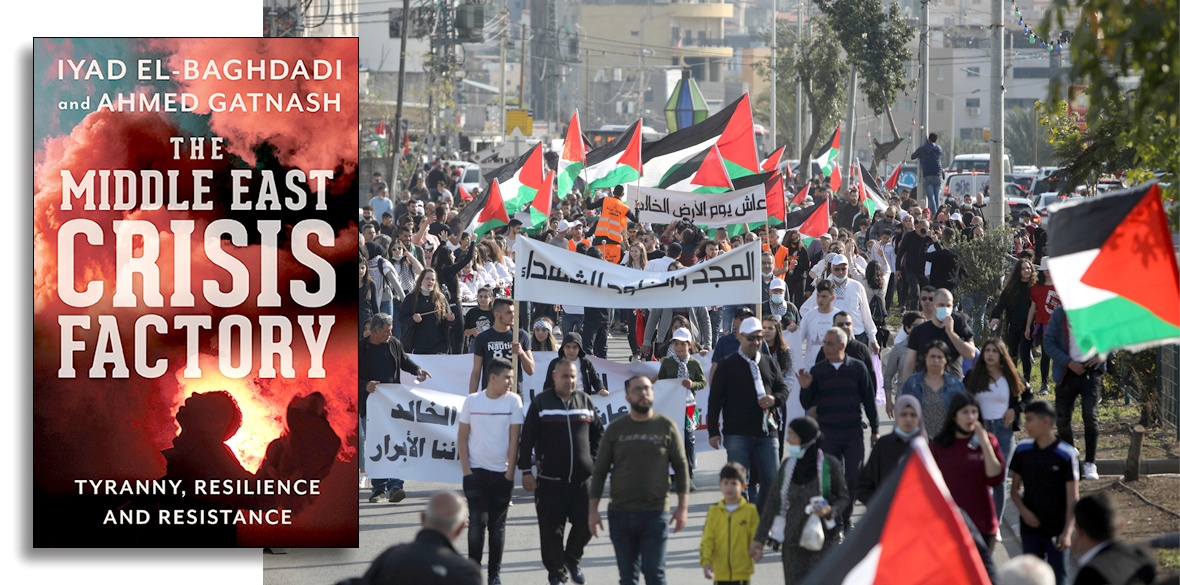This is the last article you can read this month
You can read more article this month
You can read more articles this month
Sorry your limit is up for this month
Reset on:
Please help support the Morning Star by subscribing here
The Middle East Crisis Factory
by Iyad al-Baghdadi and Ahmed Gatnash
(Hurst, £14.99)
THE political order of the Middle East is in the process of collapse and, for those struggling for an order of dignity and democracy across the region, there’s no hope of reforming the existing power structure.
That is the verdict of activists Iyad al-Baghdadi and Ahmed Gatnash in their new book The Middle East Crisis Factory.
But this is not a statement of despair but one of defiance from the generation of the 2011 uprisings.
“There is no hope that the collapse can be stopped. We gave up all hope in that order long ago,” they write. “Let it come crashing down so we can have a shot at a life of liberty.”
Part history, part human rights manifesto and part advice manual for Western governments, the book describes how a history of Western intervention, cynical alliances with dictatorships and the failure of post-colonial governments have led to this point.
Baghdadi, a Palestinian entrepreneur and human rights activist is a former associate of Saudi journalist Jamal Khashoggi, is now a political refugee in Norway. Gatnash is a Libyan political exile based in London.
The “crisis factory” of the book’s title is the triangle of post-colonial authoritarianism, Western support for tyrants and military intervention and extremism.
Each of these forces and structures feed into each other in a destructive cycle which inhibits and prevents the emergence of civic and democratic governance across the region.
The writer-activists see the battle for human rights and democracy across the Middle East since 2011 as moving beyond traditional nationalism, anti-imperialism and Islamism.
The Baathist regimes in Iraq and Syria are examples of dictatorships that saw themselves as anti-imperialist and yet, according to the authors, their actions and flagrant abuses ultimately exposed their countries to intervention and foreign occupation.
The thesis that there is a symbiosis between the forces of tyranny, Western neocolonialism and extremism is bold and arresting. Yet the question arises as to whether the authors are deploying it fairly in all cases.
In the wake of the 2011 uprisings, Western liberal rhetoric is contrasted with the cynical realpolitik that prioritised stability over human rights.
The authors berate the US administration of Barack Obama for signing a nuclear agreement with the Islamic Republic of Iran that sidelined its abuse of human rights, while allowing Iran to continue its interference across the region from Syria to Yemen, an argument remarkably close to the one used by Donald Trump when he unilaterally withdrew from the agreement in 2018.
They rightly oppose the history of military intervention and the blanket use of economic sanctions that cause immense suffering to the peoples while failing to dislodge regimes such as Iran’s or Syria’s.
The better way, they argue, is “smart” sanctions targeting individual leaders’ assets that are less hurtful to the people being oppressed, such as have been used against Russia’s Vladimir Putin and his cronies.
Another tool available both to human rights activists and legal groups is the use of universal jurisdiction legislation that has seen individual officials of the Assad government brought to court in countries such as Germany and Spain.
El-Baghdadi places the Middle East conflict within the same triangulated framework, arguing that Israeli colonialism has been aided to some extent by the choices of Palestinian leaders, including Yasser Arafat and Hamas, in favour of armed attacks and terrorism.
They draw a direct parallel between the way US intervention in Iraq feeds terrorism and how Palestinian violence “served to justify Israel’s occupation of the Palestinian Territories.”
This critique, echoing those of liberal zionism comparing armed resistance to the violence of the Israeli occupation and its refusal of all genuine attempts to find a peaceful end to the conflict, seems deeply flawed.
Violence breeds violence but we must at least identify where the violence begins. It has a structural cause, settler colonialist and imperialist, which inevitably leads to resistance.
Hamas, following the wave of attacks against Israeli civilians in the Second Intifada, has changed strategy, favouring electoral and popular mobilisation and also seeking diplomatic options to end the conflict, all of which have been shut down brutally by Israel and its Western allies.
And in the Great March of Return in 2018, as in multiple Israeli attacks on Gaza since 2008, peaceful protest was met with Israeli snipers.
The authors barely acknowledge this, although they do identify Benjamin Netanyahu’s long record of weaponising terrorism against all forms of peaceful activism, as other leaders in the region have done.
One of the book’s many insights is that that colonialism and occupation do not always come from outside but can also be imposed from within, when a dictatorship treats its own population as the colonial “other”to be caged and repressed, in a continuation of earlier colonial regimes.
Baghdadi is associated with the Oslo Freedom Forum, founded by wealthy Venezuelan-Norwegian Thor Halvorssen and funded by Silicon Valley billionaire Sergey Brin and PayPal founder and conservative libertarian Peter Thiel.
This may offer a clue to the book’s partial infusion with Western think tank narratives on the region’s politics and its offering of solutions that at times appear detached from the lived struggles of people resisting dictatorship and neocolonialism.












